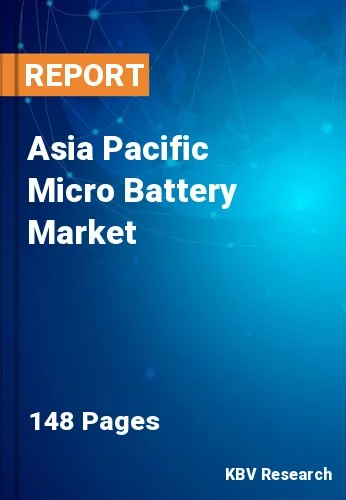The Asia Pacific Micro Battery Market would witness market growth of 22.4% CAGR during the forecast period (2023-2030).
Micro batteries, like thin film and printed batteries, are made to work with goods that require an onboard ultra-thin power supply. With their flexibility and availability in thin and ultra-thin sizes, printed batteries can be used as a power source in many applications, including wearable devices, consumer electronics, smart packaging, smart cards, and medical equipment. Developing thin film and printed batteries has also led to new application fields, including smart textiles, wireless sensors, and energy-harvesting devices.
The market is expected to rise due to increasing demand for them from various medical equipment and devices and the development of Internet of things technology. Long-term lucrative growth prospects for the market will also be produced by the growing uptake of wearable technology in developed nations. The complexity of conventional battery technology also boosts the market.
The micro battery is a small single-cell battery with metal components to protect the body from wire or circuit breakage. This light weighted, flexible, and compact battery provides several benefits, such as customization services to customers by fitting into any product according to its convenience, shapes, and sizes without any loss of efficiency.
Asia-Pacific’s medical device industry is well-established and includes high-end diagnostic imaging equipment and mass-market glucose monitors. Among wearable technology, the region has a high demand for devices like heart rate monitors and fitness trackers. The Japanese government is considering ways to increase R&D in the medical technology sector to enhance the production of digital goods like wearable skin adhesives. All these developments in the medical field will encourage the widespread implementation of wearable sensors, which will further fuel regional market expansion.
The China market dominated the Asia Pacific Micro Battery Market by Country in 2022, and would continue to be a dominant market till 2030; thereby, achieving a market value of $203.3 million by 2030. The Japan market is anticipated to grow at a CAGR of 21.7% during (2023 - 2030). Additionally, The India market would register a CAGR of 23.2% during (2023 - 2030).
Based on Battery Type, the market is segmented into Secondary, and Primary. Based on Type, the market is segmented into Thin Film Batteries, Printed Batteries, Solid-state Chip Batteries, and Button Batteries. Based on Material, the market is segmented into Lithium, Alkaline, and Silver Oxide & Others. Based on Application, the market is segmented into Medical Devices, Smart Packaging, Consumer Electronics, Smart Cards, Wireless Sensors, and Others. Based on Capacity, the market is segmented into 10-100 mAh, Below 10 mAh, and More than 100 mAh. Based on countries, the market is segmented into China, Japan, India, South Korea, Singapore, Malaysia, and Rest of Asia Pacific.
Free Valuable Insights: The Worldwide Micro Battery Market is Projected to reach USD 2.1 Billion by 2030, at a CAGR of 22.2%
The market research report covers the analysis of key stake holders of the market. Key companies profiled in the report include Panasonic Holdings Corporation, VARTA AG, Murata Manufacturing Co., Ltd., TDK Corporation, Berkshire Hathaway, Inc. (Duracell, Inc.), Ultralife Corporation, Maxwell Technologies (UCAP Power, Inc.), Cymbet Corporation, Enfucell Oy, Koch Industries, Inc. (Molex LLC).
By Battery Type
By Type
By Material
By Application
By Capacity
By Country
Our team of dedicated experts can provide you with attractive expansion opportunities for your business.

